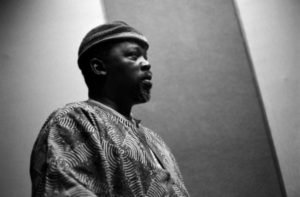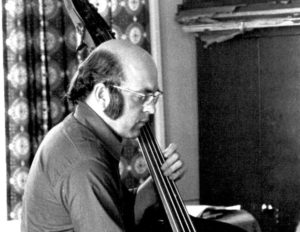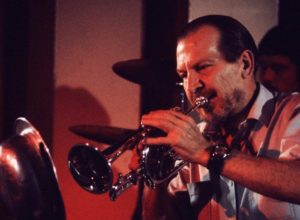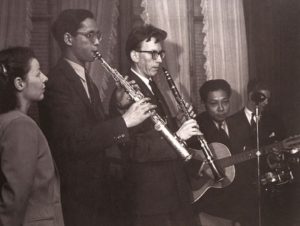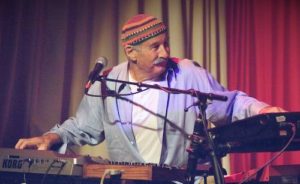Peter King
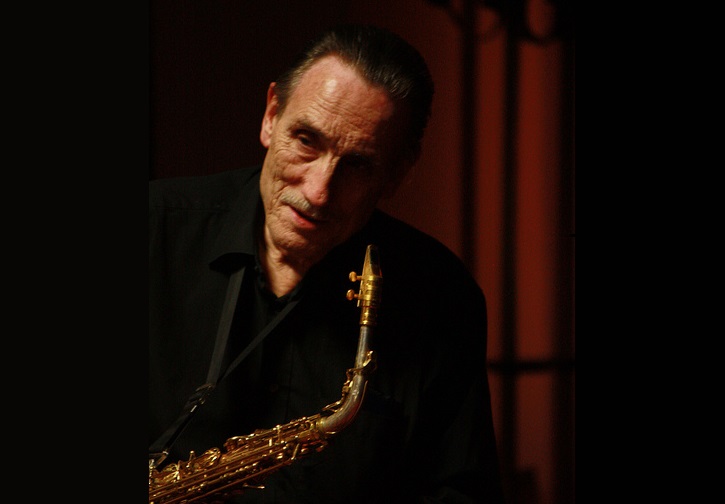
Peter King (born 1940) was still just 18 years old when he played one of his most historic gigs, after being booked by Ronnie Scott to open his new club in 1959. King grew up in Surrey and was self-taught on clarinet from the age of 15, having been inspired by the film, The Benny Goodman Story. Hearing Charlie Parker led him to turn to the alto saxophone. He had been playing professionally for little more than a year, leading his own quartet, before he played the opening of Ronnie Scott’s Jazz Club. In 1960, King was named ‘New Star’ in a Melody Maker poll. That year, he joined John Dankworth‘s orchestra, staying with him until 1961, when he travelled to Paris to hear, and as it turned out sit in with one of bebop’s founders, Bud Powell. Back in London, he was in Tony Kinsey‘s Quintet from 1961, a group that included Les Condon on trumpet and Gordon Beck on piano. King made some of his earliest recordings with this group, including a session with singer Annie Ross. When Ross opened a nightclub in 1964, she booked the saxophonist to lead the house band. The residency at Annie’s Room led to work with visiting American singers like Anita O’Day and Dakota Staton. He also recorded with George Fame, a musical relationship that would last into the 2000s, and in a sextet with Al Cohn and Zoot Sims.
Though the job offers and recognition were there, King had sadly picked up a serious drug habit, perhaps in unconscious emulation of his hero, Charlie Parker. The addiction plagued him for many years until his wife, Linda, helped him to recover. In 1969, King joined the modernist big bands of Stan Tracey and Tubby Hayes, and also appeared on Maynard Ferguson‘s pop album MF Horn. As perhaps the finest exponent of bebop that Britain has produced, it was natural that he should be sought out by Bill Le Sage, when in 1971, the pianist/vibraphonist organised a Bebop Preservation Society, which played regularly at the Bull’s Head in Barnes throughout the 1970s and 80s, and recorded with ex-Charlie Parker trumpeter Red Rodney. When Stan Tracey downsized to an octet in the mid-1970s, King was there alonside Harry Beckett, Art Themen, Don Weller, Dave Green, Malcolm Griffiths and Brian Spring. Only in 1977 did King record as a band leader, in a group co-led by flugelhorn player Jon Eardley with John Taylor on piano, Ron Mathewson on bass, and Mickey Roker on drums. He played with another bebop ‘original’ in 1982, the pianist Al Haig in a concert that was recorded and became Haig’s last release before his death.
From the 1980s, King began to record and perform more frequently in his own name, most often in a quartet with John Horler, Dave Green and Spike Wells. During the mid 1980s, he recorded regularly with the pop group Everything But The Girl, and also began working in Charlie Watts’ jazz groups, an association with has continued for decades. In the 1990s, he worked with pianist Julian Joseph, and began to incorporate post-Coltrane vocabularly into his playing. King has remained a much in demand session player, and as such can be heard on recordings by artists as diverse as Quincy Jones, Kiri Te Kanawa, Buzzcocks, Hoagy Carmichael and Jimmy Witherspoon. In 1999, King performed in Sir Peter Hall’s West End production of ‘Lenny’ starring Eddie Izzard. He began a friendship with the Oscar nominated screenwriter of Lenny, Julian Barry, which led to their collaboration on an opera ‘Zyklon’ with music by King, which premiered in New York in 2004. The following year, he recorded an album Janus, influenced by the music of Bartok, and was named BBC Jazz Musician of the Year. Ill health and the tragic loss of his wife, after almost forty years of marriage, have taken their toll, but King still performs in London, with a monthly residency at the 606 Club. He published his autobiography ‘Flying High’ in 2011.
Key Recordings:
With Stan Tracey, Tony Kinsey
East 34th Street (Spotlite 1983)
Lush Life (Miles Music 1998) with Lyric String Quartet
